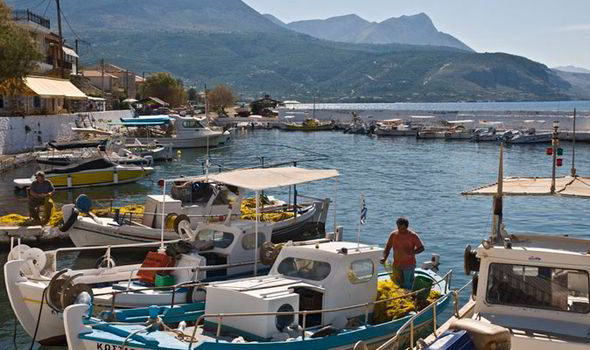THE fishermen of Agios Nikolaos have developed a well-honed routine that means they don’t have to move very far.
 |
| Stoupa beach with the Taygetos mountains in the background |
By midday they are spread along the prom like sparrows on a wire, arguing and drinking coffee before the hour of the siesta.
In the evening they’re back but this time spruced up (a clean T-shirt, perhaps) and their seats along the prom have been taken by tourists, to whom they serve the fish they caught that morning, cooked by their wives.
It’s a simple routine that’s been at the heart of Greek tourism for decades. Agios Nikolaos and its neighbouring resort of Stoupa are in the remotest part of the southern Peloponnese, the hand of land that waggles its fingers in the Aegean.
They are in a region called Mani, once the wildest area of Greece, sealed off behind a mountain range that could only be crossed on foot.
That very isolation made it a magnet for eccentrics and political outcasts helping to preserve its beauty, for the Mani peninsula’s landscape is of thunder-making mountains that tumble down to the sea, with villages as barely-tolerated ochre encrustations on their elongated toes, Stoupa and Agios Nikolaos among them.
There’s something unique and timeless about Greek tourism, and it’s not surprising that the country’s economic situation has virtually no impact here. In neighbouring Stoupa, a 25-minute shoreline walk from Agios Nikolaos beside a gin-clear sea, I talk to a couple of hoteliers.
“What’s the point in us going on strike?” they say, pointing out that all the properties in the resort are small and family-owned, so if they need to cut costs theyjust get more of the family to do more of the work.
Besides, there are always the olive groves, the fishing and the vegetable gardens to attend to.
In other areas of the Mediterranean tourism has been turned over to big business which has struggled with economic difficulties and employment legislation.
However Mani’s policy of keeping it in the family is ideally suited to managing the winds of change.
 |
| Fisherman mending nets in Ayios Nikolaos |
British and German enthusiasts for the region, including writers and film directors, have bought houses here and Stoupa’s perfect horseshoe-shaped sandy beach brings the occasional bus-load of new arrivals from the charter airport at Kalamata, but this is package tourism at its more restrained.
Stoupa’s immaculate little seafront for example is still lined with tavernas, many of them offering an array of delicious dishes with ingredients “from our vegetable garden”.
Prices are modest, given the location, and you can get a main course-sized Greek salad for £5, rabbit in red wine for £7, a glass of wine for £1.50 and local beer for £2.50, although if you want to eat fish you have to pay a lot more.
The blight of the all-inclusive, which is closing down little family-run restaurants all over the Mediterranean, hasn’t yet struck here so there’s still a convivial, colourful atmosphere along the seafront in the evenings.
Young people in search of a livelier scene tend to gravitate towards Kalogria beach, the next bay along, where the bars are livelier and the music is much loud.
A lot of the visitors are British but numbers are few.
Only three apartments in the Stephanou Inn in Agios Nikolaos were occupied when I was there and owner Angelique Stephanou was, like many Greeks, indignant about the well-connected fat cats in Athens, themselves avoiding belt-tightening while forcing austerity on the man in the street.
For now, looking selfishly at these two resorts, I can see the crisis acting as a preservative, saving them from being spoiled.
Unfortunately the future may not be that far off with the construction of a new motorway running from Athens to just north of Kalamata.
So for the time being, the likes of Stoupa and Agios Nikolaos are preserved in aspic.
Prices will remain competitive, the fishermen will continue to do their morning shuffle, and there’s plenty of room for everyone on the beach.
Sunvil Holidays (0208 758 4758/ www.sunvil.co.uk) offers seven nights at the Stephanou Inn in Agios Nikolaos from £688pp (two sharing a studio apartment), self-catering. Price includes return flights from Gatwick and transfers. Greek National Tourism Organisation: 0207 495 9300/ www.visitgreece.gr
http://www.express.co.uk/life-style/travel/379673/The-Greece-that-time-forgot

No comments:
Post a Comment